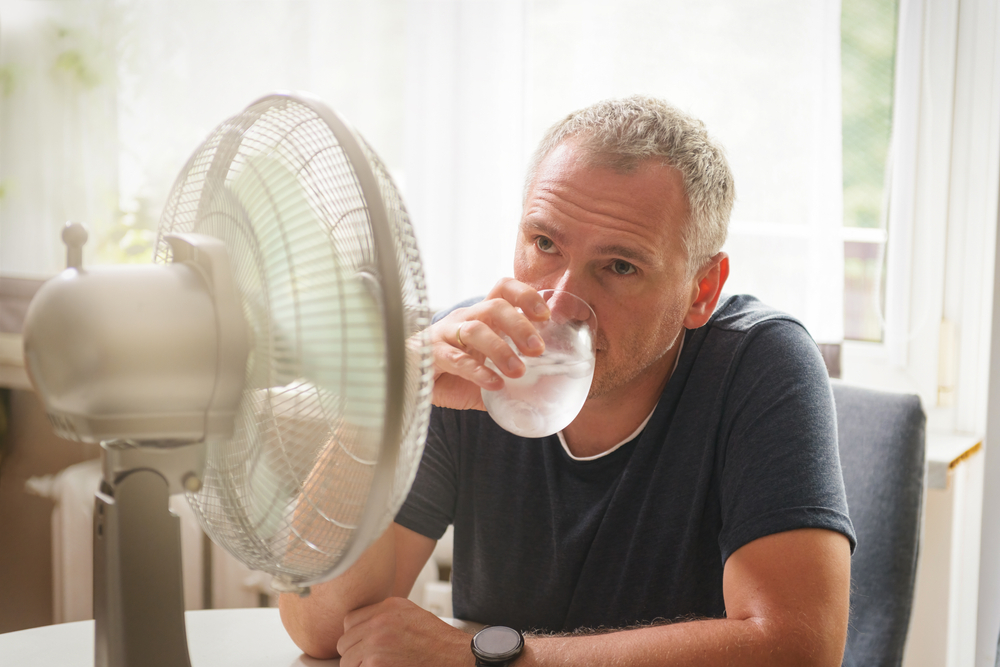Hot Flashes in Men
Feb 21, 2025
When we think of hot flashes, we typically associate them with women going through menopause. However, many men are surprised to learn that they too can experience this uncomfortable symptom during andropause, or male menopause. While less common than in women, hot flashes in men are a real phenomenon that can significantly impact quality of life.
Understanding Male Hot Flashes
Hot flashes in men are sudden feelings of intense heat that aren't caused by external sources. They often begin in the face, neck, or chest, and can spread throughout the body. These episodes are usually accompanied by sweating and can sometimes be followed by chills. They can occur day or night, with nighttime occurrences often referred to as "night sweats."
The exact mechanism behind male hot flashes isn't fully understood, but it's believed to be related to hormonal changes, particularly decreasing testosterone levels. As men age and enter andropause, the decline in testosterone can affect the hypothalamus, the part of the brain responsible for regulating body temperature.
Prevalence and Triggers
While not as common as in women, studies suggest that up to 80% of men undergoing androgen deprivation therapy for prostate cancer experience hot flashes. For men going through natural andropause, the prevalence is lower but still significant, with some estimates suggesting that up to 30% may experience this symptom.
Common triggers for male hot flashes include:
- Stress
- Alcohol consumption
- Caffeine
- Spicy foods
- Hot drinks
- Warm environments
- Certain medications
Impact on Daily Life
For men experiencing frequent or severe hot flashes, the impact on daily life can be substantial. They may cause:
- Sleep disturbances, leading to fatigue and irritability
- Embarrassment in social or professional situations
- Discomfort and the need to adjust clothing or environment frequently
- Anxiety about when the next episode might occur
Managing Male Hot Flashes
While hot flashes can be challenging, there are several strategies men can employ to manage this symptom:
- Identify and Avoid Triggers: Keep a journal to track when hot flashes occur and what might be triggering them. This can help you avoid or minimize exposure to personal triggers.
- Dress in Layers: This allows you to easily remove clothing when a hot flash begins and add layers back when it passes.
- Keep Cool: Use fans, open windows, or adjust air conditioning to maintain a comfortable temperature. Keeping a cold water bottle or cooling towel handy can also help.
- Practice Stress-Reduction Techniques: Since stress can trigger hot flashes, techniques like deep breathing, meditation, or yoga may help reduce their frequency and intensity.
- Maintain a Healthy Lifestyle: Regular exercise, a balanced diet, and limiting alcohol and caffeine intake can all contribute to reducing hot flash symptoms.
- Stay Hydrated: Drinking plenty of water can help regulate body temperature and replace fluids lost through sweating.
- Consider Herbal Remedies: Some men find relief with herbs like black cohosh or evening primrose oil, though scientific evidence for their effectiveness is limited. Always consult with a healthcare provider before starting any herbal regimen.
Medical Interventions
For men experiencing severe or frequent hot flashes that significantly impact their quality of life, medical interventions may be considered:
- Hormone Therapy: In some cases, testosterone replacement therapy may be recommended. However, this treatment carries risks and is not suitable for all men, particularly those with a history of prostate cancer.
- Non-Hormonal Medications: Certain antidepressants, particularly selective serotonin reuptake inhibitors (SSRIs), have shown effectiveness in reducing hot flashes in some men.
- Acupuncture: Some studies suggest that acupuncture may help reduce the frequency and severity of hot flashes in men.
When to Seek Help
If you're experiencing hot flashes that are frequent, severe, or impacting your quality of life, it's important to consult with a healthcare provider. They can help rule out other potential causes, such as thyroid problems or certain medications, and discuss appropriate management strategies.
Embracing Open Communication
Many men feel embarrassed about experiencing hot flashes, viewing them as a "women's issue." However, it's crucial to remember that this is a natural symptom that many men experience. Open communication with partners, family members, and healthcare providers can lead to better understanding and support.


